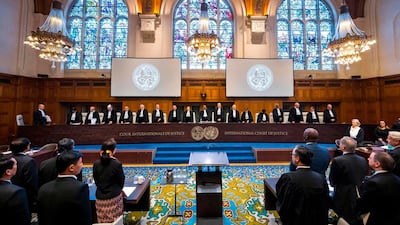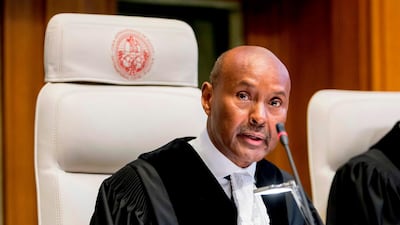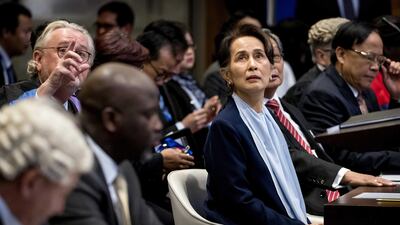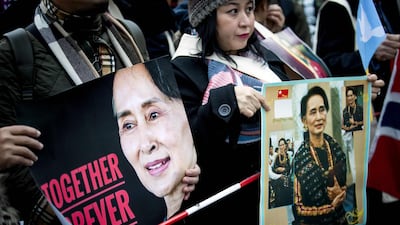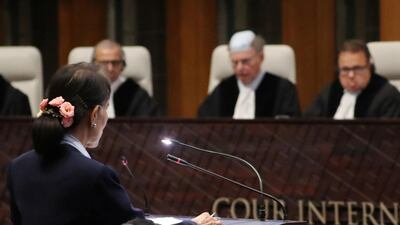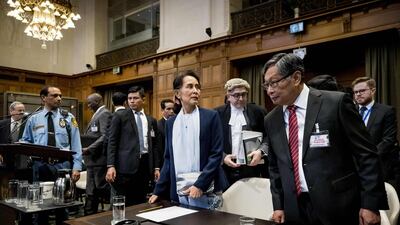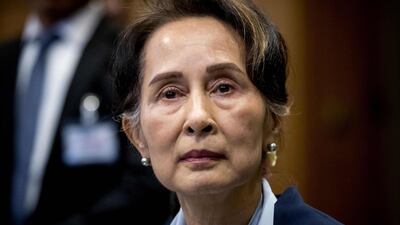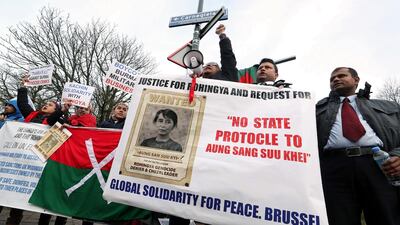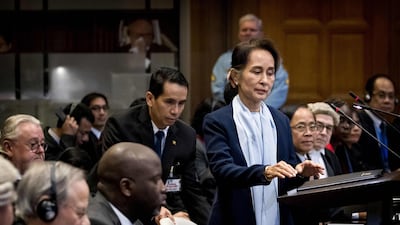Aung San Suu Kyi has defended the actions of Myanmar's military at the UN's top court, saying that allegations of genocide against Rohingya Muslims were "misleading and incomplete".
The Gambia, a small West African country, launched its case against Myanmar at the International Court of Justice (ICJ) on Tuesday.
Gambian Justice Minister Abubacarr Tambadou said it would be "extremely disappointing" if Myanmar's civilian leader repeated previous rejections of wrongdoing by the generals that once kept her under house arrest.
But addressing the ICJ on Wednesday, Ms Suu Kyi did exactly that.
"Regrettably The Gambia has placed before the court a misleading and incomplete picture of the situation in Rakhine state," she said.
Ms Suu Kyi challenged claims that events in 2017 in Rakhine State, home to the country's Muslim minority, could be legally classed as genocide. She said that problems in the region "go back centuries".
Ms Suu Kyi conceded that "disproportionate force" might have been used by soldiers at times. While Myanmar has prosecuted seven military officials for abuses, they were set free after serving less than a year of 10-year sentences.
She said a military-led "clearance operation" had taken place in western Rakhine State as a counterterrorism response to armed Rohingya attacks on dozens of police stations.
However, repression of the region’s Rohingya long predates the October 2016 incidents in which armed groups targeted the Myanmar military, the justification for launching the clearance operation.
UN investigators have said around 10,000 people, including women and children, may have been killed during the military crackdown.
More than 730,000 Rohingya fled Myanmar to neighbouring Bangladesh where they live in the world’s biggest refugee camp, Kutupalong in Cox’s Bazar. Ms Suu Kyi, 74, said Myanmar was working with Bangladesh to repatriate those who fled.
Mark Farmaner, director of Burma Campaign UK, accused Ms Suu Kyi of “barefaced lying” during her testimony and said her civilian government was guilty of genocide.
He told The National that Ms Suu Kyi's decision to appear at the ICJ was politically motivated.
“Aung San Suu Kyi is facing election next year. She hasn’t delivered on a lot of her election promises and she is using this case domestically to whip up nationalist support,” he said. “And separately by defending the military internationally, she is trying to persuade them that she is not a threat at all.”
The Gambia’s lawyers gave detailed descriptions of how the Rohingya were raped, murdered and had their homes burnt to the ground on the first day of the three-day hearing.
The Gambia, which is a Muslim-majority state and a member of the 57-nation Organisation of Islamic Co-operation, is initially seeking ICJ approval for temporary measures to be put in place protect the Rohingya. A ruling of genocide could be years away.
Amnesty International's regional director Nicholas Bequelin called the suggestion that Myanmar would be able to independently prosecute those suspected of crimes under international law "nothing but a fantasy".
He said senior military figures who orchestrated the human rights violations had already "enjoyed decades of total impunity".
A small group of pro-Rohingya protesters gathered outside of the court in The Hague shouting: "Aung San Suu Kyi, shame on you."
In the city of Yangon in Myanmar, several hundred people watched a live broadcast of the hearings in a park. There have been demonstrations of support for Ms Suu Kyi in the city.
Mr Farmaner said the civilian leader’s actions would lead to everyone in Myanmar suffering.
“Although she might be taking comfort that the country's Buddhist majority is standing behind her on this case, she is actually polarising the country by letting other ethnic minority groups see her defend the crimes of the military that have persecuted them too,” he said.
“Internationally, it is going to make it harder for Myanmar to get the support it needs for economic development and improve the standards of people when you have an authoritarian government that is denying genocide and committing its own human rights violations."
He said Ms Suu Kyi was leading the country “down a dangerous and tragic path”.
